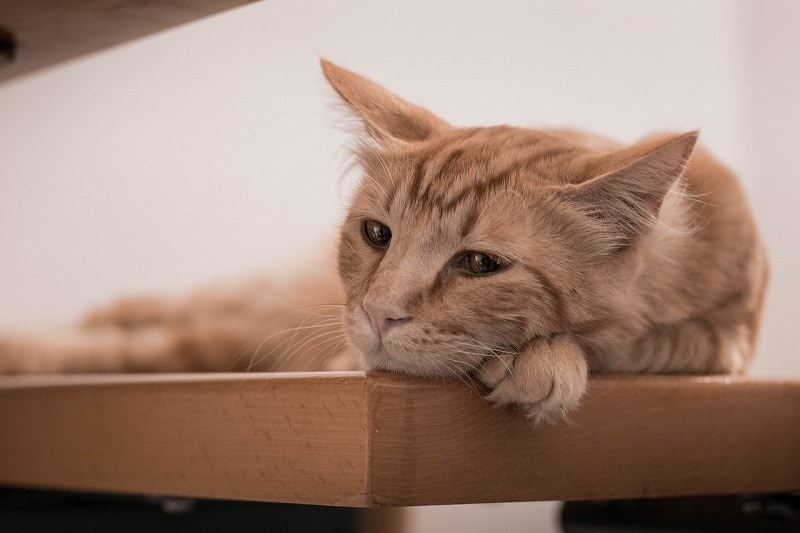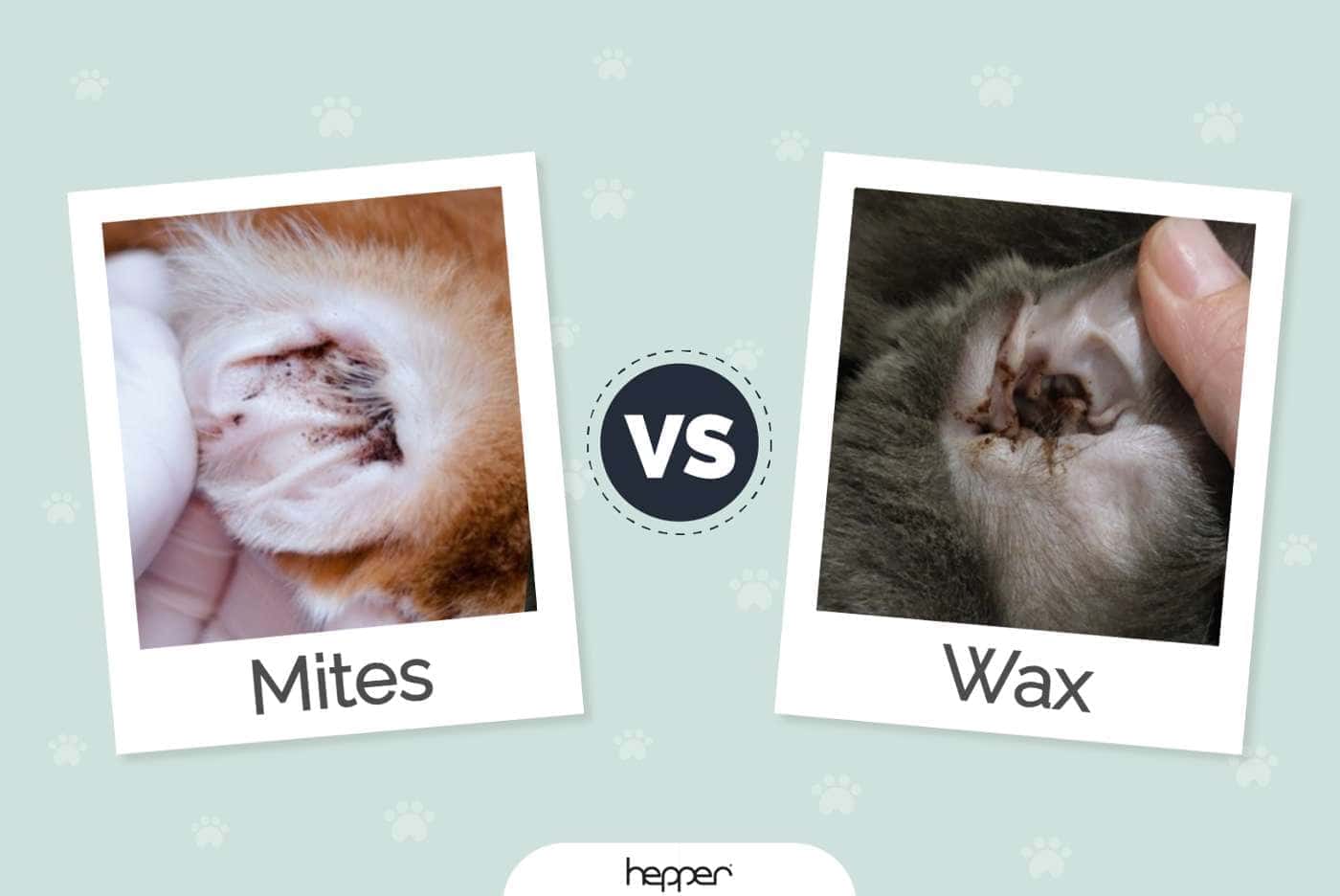Do Neutered Cats Spray? 4 Vet-Reviewed Reasons

Updated on

It’s a common misconception that neutered cats don’t spray. While getting your intact male cat neutered can reduce unwanted behaviors, neutered cats can still spray for various reasons. You might be surprised to learn that female cats have been known to spray too.
Since spraying, especially indoors, is an unpleasant and messy habit, we put together this guide to explain why neutered cats spray. We also compiled handy advice to help you stop this bad habit.
What Is Spraying?
Spraying is how intact male cats mark their territory. They’ll back up to a vertical surface, whether it’s a tree, wall, or your sofa, and urinate. It’s never large amounts, just enough to make their presence known. Less often, both male and female cats will mark their territory by defecating or peeing on the floor.
Although it’s commonly believed that only male cats spray, intact female cats sometimes do too, especially if they’re in heat. By marking their territory with their pheromones, they alert male cats to their presence and desire to mate.
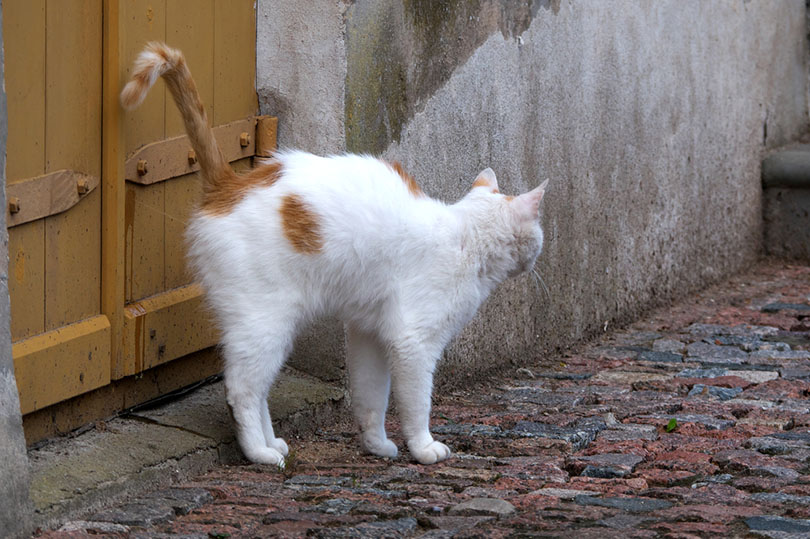
Why Do Neutered Cats Spray?
While they won’t be inclined to mark their territory as much as intact male cats will, neutered cats desire the same control over their space. Cats in general don’t like sudden changes. They enjoy familiarity and routine, which is why they’ll wake you up at the same time every day for breakfast and get grouchy whenever the clocks change or you decide to sleep in.
Here are a few of the biggest reasons that your cat, neutered or otherwise, is spraying around your house.
The 4 Main Reasons a Neutered Cat Is Spraying
1. Change in Environment
Moving to a new house or introducing a new cat to the family can cause your neutered cat to act out. Even something as simple as rearranging the furniture in your bedroom can throw them off balance.
They’ll announce their displeasure and try to make themselves feel better about the sudden change by marking their territory. Unfortunately, if they’re indoor cats, this means you’ll find a few messy puddles to clean up or damp patches on the walls.
While it’s unpleasant for us, it’s our cat’s way of adjusting to their new situation. This also includes any changes in the social environment; for example, in the case of a new pet, they might spray to show their new living companion who’s the territory owner.

2. Stranger Danger
Spraying because of strangers mostly comes back to territory issues, but it can also be caused by fear and uncertainty of a new situation or person.
People
Some cats hide from anyone whom they’re not used to being around the house. They’ll dart under the sofa and refuse to come out until the intruder leaves. Other, more sociable felines will happily beg for ear scratches from everyone, from your best friend to the technician checking your electric meter.
Not all cats get along with everyone, though, and they’re good at judging people’s characters. If your neutered feline is prone to anxiety or is territorial and not that social, there is a chance that they will spray their territory to reaffirm their ownership or even in rare and extreme cases, the person or their belongings. Likewise, a scared, anxious cat is more likely to spray.
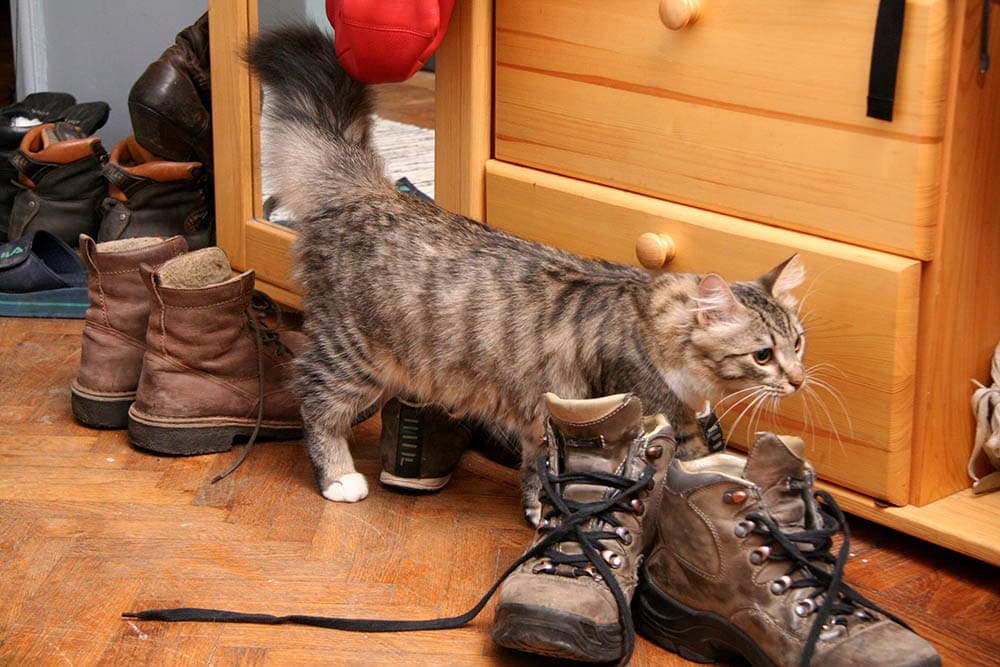
Other Cats
We all like having space to ourselves, and your cat is no different. If your cat catches the scent of or spots a neighbor cat strolling through their garden, they’re more likely to mark their territory.
This doesn’t just extend to your outdoor cat; house cats will also do their best to fend off perceived invaders. While they might not be able to go outside, they can still protect their turf. They don’t want the wandering feline to make themselves at home, after all.
3. Litter Box Issues
Both single- and multi-cat households can suffer from overfilled litter boxes. If you don’t keep the box clean enough or you don’t have enough litter trays for the number of cats that you own, you’ll be more likely to find your cat using the toilet wherever they can, including your new rug.
Cats enjoy cleanliness, and since they can’t flush, sharing their toilet with other cats can become discomforting. In the same way, if you don’t clean your single cat’s litter tray often enough, they’ll be less likely to use it.
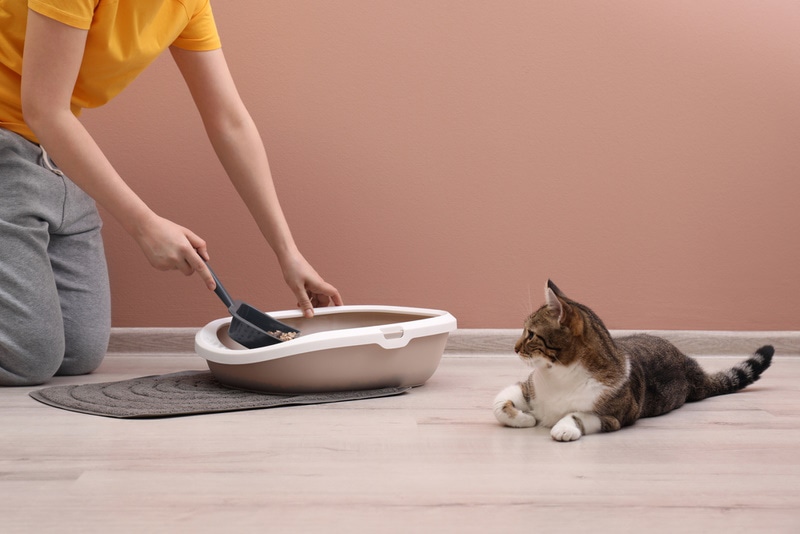
4. Health Issues
Sometimes, your cat isn’t spraying to comfort themselves or ward off unwanted guests. Health issues can also be why your neutered cat is spraying, and these can range from:
- Cystitis
- Bladder stones
- Sterile cystitis
Veterinary Advice
If your neutered cat is still spraying and you have not identified any of the previous causes or scenarios or if your cat is showing any signs of underlying health issues—for example, bloody urine or straining—check in with your veterinarian as soon as possible. They’ll be able to better determine the issue affecting your cat and help you take steps to stop them from urinating everywhere.

The 4 Ways to Stop Your Neutered Cat From Spraying
Now you know what causes your cat to feel the need to spray, we can help you stop the unwanted behavior with one of the following solutions.
1. Stay Calm
Your cat spraying where they’re not meant to can be annoying, but it’s best if you don’t yell at them. While it’s an easy solution, if your anxious cat is spraying because they’re frightened, screaming at them won’t help. Instead, try to narrow down the root of their misbehavior and determine a way forward that takes into account why they’re spraying.
2. Provide Familiar Items
The biggest thing that helps cats feel at home is familiar scents. If you move to a new house, this is especially important. If you keep your furniture in the move, this will be easier because your cat will already be familiar with the items, even if they are in a different location.
In the case of starting fresh, make sure your cat has a safe space that they can curl up in with their favorite blanket or one of your old sweaters; give them something that smells like home so they can start to adjust to their new surroundings with nearby familiarity. It’ll make the sudden change less jarring.
This also works if you need to leave them at a cattery for any amount of time. You can leave their preferred bedding and a favorite toy in their carrier.
3. Provide Plenty of Space
While it can be difficult in small households, offering plenty of space for your felines to sit together will help them co-exist without feeling slighted. This goes for litter trays, food bowls, water dishes, and even napping spots.
As a rule of thumb, your cats should each have a litter box and an extra one, just in case. More litter does mean more work for you during your cleaning sessions, but it will also be more likely to convince your cats to seek out a clean litter tray instead of going to the toilet wherever they want.
Feeding your cats in their own bowls can help cut down on territorial behavior. You can also monitor how much food your cats are getting and make sure the more timid felines are eating their fair share. Try to supply plenty of water dishes to make sure all your cats drink as much as they need.
As for napping spots, cats are happy to cuddle together, but they also like space to themselves. Consider investing in a cat tree with multiple perches to offer various places for your cats to sit, both up high and lower down.
4. Remove Spray Marks
Once a cat sprays, it’s easy for them to come back and refresh the mark. While it’s an unpleasant job, cleaning up urine spray is the best way to avoid reinforcing the behavior. Avoid ammonia, and use enzyme-based cleaners for the best results and to keep your home smelling fresh.
Final Thoughts
Although neutered cats don’t spray as much as intact males, there are occasions when they will spray. Most often, they’ll spray if they feel uncomfortable, whether it’s because their litter tray is full or there’s a new cat in the house. Moving to a new house or rearranging the furniture can also cause your cat to seek ways to make themselves more comfortable, which includes marking their scent on their favorite things.
Fortunately, there are several ways to help eliminate the behavior, but it all starts with understanding the cause and triggers. Hopefully, this guide has helped you to have a better understanding of the possible reasons and provided some methods to stop your neutered cat from spraying around your house.
Featured Image Credit: anlomaja, Shutterstock





